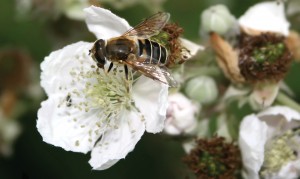Groups seek research on pesticides

Major environmental groups are calling on the federal government to take action on declining bee populations. A conditional agreement with pesticide producers that called for studies to determine if pesticides were chronically harming bees has not been nationally enforced.
The Pest Management Regulatory Agency, which is run by Health Canada, has been asking for the studies on neonicotinoid pesticides and their effects on bees since 2004, when agreements were first made with pesticide manufacturers.
Four groups, the Sierra Club Canada Foundation, the David Suzuki Foundation, Equiterre and the Wilderness Committee, are demanding these studies, which were meant to determine the chronic toxicity effects on bees and other pollinating insects, so that beekeepers might get clear answers as to what the possible effects on their bees might be.
“These studies on the chronic toxicity have not been done and have never been submitted to the Pest Management Regulatory Agency,” said John Bennett, executive director of the Sierra Club Canada Foundation.
“When do these conditions have to be met?”
Beekeepers in Ontario, as well as other parts of Canada, have seen a continual decline in once healthy bee populations over the past few years.
These alarming bee deaths have both economic and environmental implications. Tibor Szabo, a beekeeper and first vice president of the Ontario Beekeepers’ Association, says his own bees and those of other farmers have been greatly affected.
“Windsor beekeepers were reporting pesticide kill on bees, which is strange that early in the spring,” said Szabo.“Then, it happened to us. We’d see a really fantastic, strong hive lose 90 per cent of its bees in one or two days. We’d see inches of dead bees in the bottom of the hives.”
The pesticides that are thought to be largely responsible for the collapse of Ontario’s bee populations are called neonicotinoids. These are essentially synthetic nicotine, meant to be carried throughout the plant to ward off pests.
However, it has been found that traces of the pesticide are carried in the nectar and pollen of treated crops.
This means bees and other pollinating insects are susceptible to poisoning.
“What we’re finding is that millions of bees are dying each year around planting time,” said Bennett. “This is because every seed sold in Ontario is pretty much sprayed with these pesticides.”
It has been confirmed that, in the past, neonicotinoid use in large doses has been responsible for the death of bee populations.
According to Bennett, of all the dead bees tested in 2013, 80 per cent had neonicotinoids in their system.
Bees and other pollinators are an integral part of the ecosystem. These pollinating insects are responsible for the production of a significant amount of the food that we eat, and are key for the economic success of Canadian farmers and beekeepers.
Bennett describes the need for bees and other pollinators in a simple way: “40 per cent of the food on your plate is dependent on pollinators, including bees.”
The issue of bee death is an ongoing one, with another Ontario planting season arriving shortly. Beekeepers continue to demand the studies they were promised a decade ago, and keep their bee populations as healthy as they can.
Minister of Health Rona Ambrose, could not be reached for comment.

